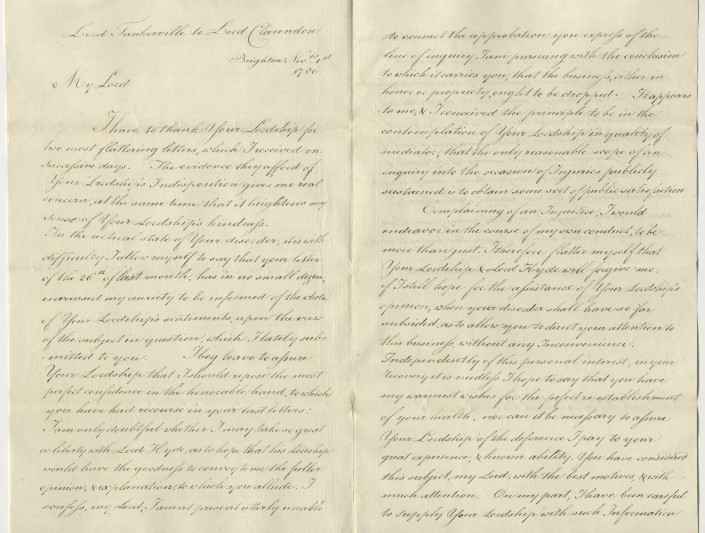Sue Wood, Head of Archives, writes: In November 2020 Northumberland Archives was able to purchase 35 letters of Charles Bennet, 4th Earl of Tankerville thanks to a grant from The Friends of The National Libraries. The letters were written and received by Charles Bennet during his joint tenure (1784-1786) with Lord Carteret as Postmaster General and relate to a dispute between the two men that was to lead to Tankerville’s dismissal by the Prime Minster, William Pitt the Younger in 1786. Tankerville was keen to reform the Post Office in particular to improve the postal service, seeking to extend its reach and speed. The dispute, known as the Dashwood Affair, arose after Tankerville objected to signing off accounts that he saw as an abuse of public monies. This abuse involved signing off a bill for furniture for Carteret’s private use. Carteret claimed that affair was a misunderstanding but used his connections to put Pitt under pressure to dismiss Tankerville.
Protestations by Tankerville led to the establishment of a government commission that revealed a number of underhand practices including the issue of suspicious invoices, irregular appointments and smuggling by seamen whose wages had been deliberately withheld. The findings of the commission led to major reforms.
The letters purchased are correspondence to and from Tankerville, relating to the Dashwood Affair. The correspondents are Lords Cartaret and Tankerville, William Pitt and Lord Clarendon. Clarendon had held the office of Postmaster General between1763-1765 and was returned to office in 1786 following Tankerville’s dismissal. The letters cover the period June 1786-December 1786.
The letters complement further correspondence relating to the Affair that have been in the care of Northumberland Archives since 1968 and are important in telling more of the story of the events surrounding Tankerville’s dismissal and the role of William Pitt in the Affair. It was usual for minsters of this period to retain their own papers – there was no rule about the surrender of public papers. As a consequence there is little about Tankerville’s tenure as Postmaster-General in either The National Archives or amongst The Post Office Archives. The papers held by Northumberland Archives are therefore of particular importance. Collectively they contradict Pitt’s reputation as a reformer demonstrating his unwillingness to support Tankerville and show the support given to Tankerville by his kinsman Charles Grey (1764-1845), the future Prime Minister.
The Tankerville family were of French descent and were first created Earls in 1418. Charles Bennet (1743-1822) was the 4th Earl under the third creation. In the 18th century the family owned an extensive estate in Northumberland with a family seat at Chillingham Castle. The family also held extensive estates in Shropshire and Sussex and had a London home, Mount Felix, at Walton on Thames. Further records of the Tankerville family are held at Shropshire Archives and West Sussex Record Office. The 4th Earl is best known for developing the rules of modern cricket.
